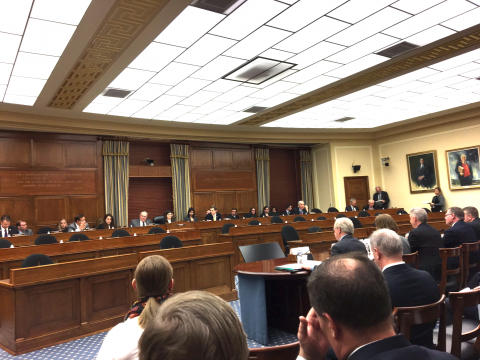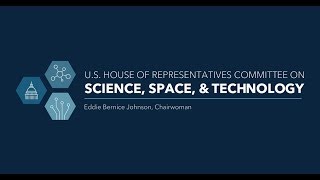On March 26, 2019 a hearing on “Revitalizing American Leadership in Advanced Manufacturing” was held by the House Committee on Science, Space, and Technology’s Subcommittees on Research & Technology and Energy.
The panel consisted of representatives from the federal agencies, institutes, and members that are part of the Manufacturing USA® network. Ryan Myers of Hexagon Manufacturing Intelligence, Mike Molnar of NIST’s Office of Advanced Manufacturing, Dr. John Hopkins of the Institute for Advanced Composites Manufacturing Innovation (IACMI), Valri Lightner of DOE’s Advanced Manufacturing Office, and Dr. Mitchell Dibbs of The Dow Chemical Company, all had the opportunity to share remarks before the panel and answer questions from representatives.

Congresswoman Eddie Bernice Johnson, Chairwoman of the House Science, Space, and Technology Committee wrote that:
Since the program’s creation and ensuing growth, the fourteen Manufacturing USA Institutes have led transformational innovations with a variety of applications.
Not only do these Institutes play an important role in developing next-generation technologies, they also foster networks built upon public-private partnerships that maximize the impact of government investment. The Institutes engage with manufacturers of all sizes to build a robust national manufacturing network and to train a workforce of tomorrow that meets the demands of emerging manufacturing sectors.
Chairwoman of the Subcommittee on Research and Technology, Rep. Haley Stevens, opened the hearing:
Today is dedicated to every student, researcher, engineer, line worker, product manager, and American family wondering about the future of the United States industrial base, our limitless potential for innovation and the strength of our workforce.
This hearing is inspired by the motivation and desire for American excellence, where the software engineers meet the assembly workers to deliver unprecedented quality.
Manufacturing USA is a network of institutes that bring together multiple federal agencies, large and small manufacturers, universities, community colleges, and nonprofits to catalyze new technologies, meet research needs and train the workforce of the future. This initiative bore out of policy prescription to answer the question we as a nation faced in the post-recession era: How can we foster a competitive innovation agenda and ensure that the research and technology happens in our communities, in partnership with a wide range of stakeholders?
Manufacturing USA now supports the co-investment of 14 Institutes supporting various research concentration from digital manufacturing to flexible electronics to remanufacturing to battery lifespan.
The Manufacturing USA Institutes are a critical part of U.S. global leadership in advanced manufacturing. The Institutes provide a unique collaborative platform for U.S. industry and academia to exchange best-in-class expertise to solve challenges and push the bounds of innovation.
Heated global competition and the race to win the future is always at our heels. We acknowledge, governments in free-market economies around the world have stepped up their investments in converting basic research into new manufacturing goods and processes. Today, Japan spends about 7% of its government R&D budget on this translational research. Germany spends about 12%. South Korea spends about 30%. The U.S., in contrast, spends just 0.5%.
We also recognize the need to develop and elevate the priority of a skilled advanced manufacturing workforce by empowering Manufacturing USA to work with its partners. The demand for manufacturing jobs is met with a gulf of readily available workers -- Currently, the skills gap for advanced technology jobs is projected to leave nearly 2.4 million positions unfilled between today and 2028, with a potential economic impact of $2.5 trillion.
And Rep. Conor Lamb, Chairman of the Subcommittee on Energy, shared that:
Our country lost over 5 million manufacturing jobs between 2000 and 2014. It is an absolute imperative that we renew our leadership in this industry – we cannot sacrifice these future opportunities for rising generations of American workers.
I believe the Manufacturing USA Institutes play a key role to that end. These Institutes are essential in helping our nation maintain a robust manufacturing base in forward-looking sectors such as biotechnology, chemical and materials processing, and robotics. These fourteen Institutes help form a national network that convenes industrial, academic, and federal partners invested in continuing U.S. leadership in advanced manufacturing.
Read the full testimonies here and watch the hearing:


